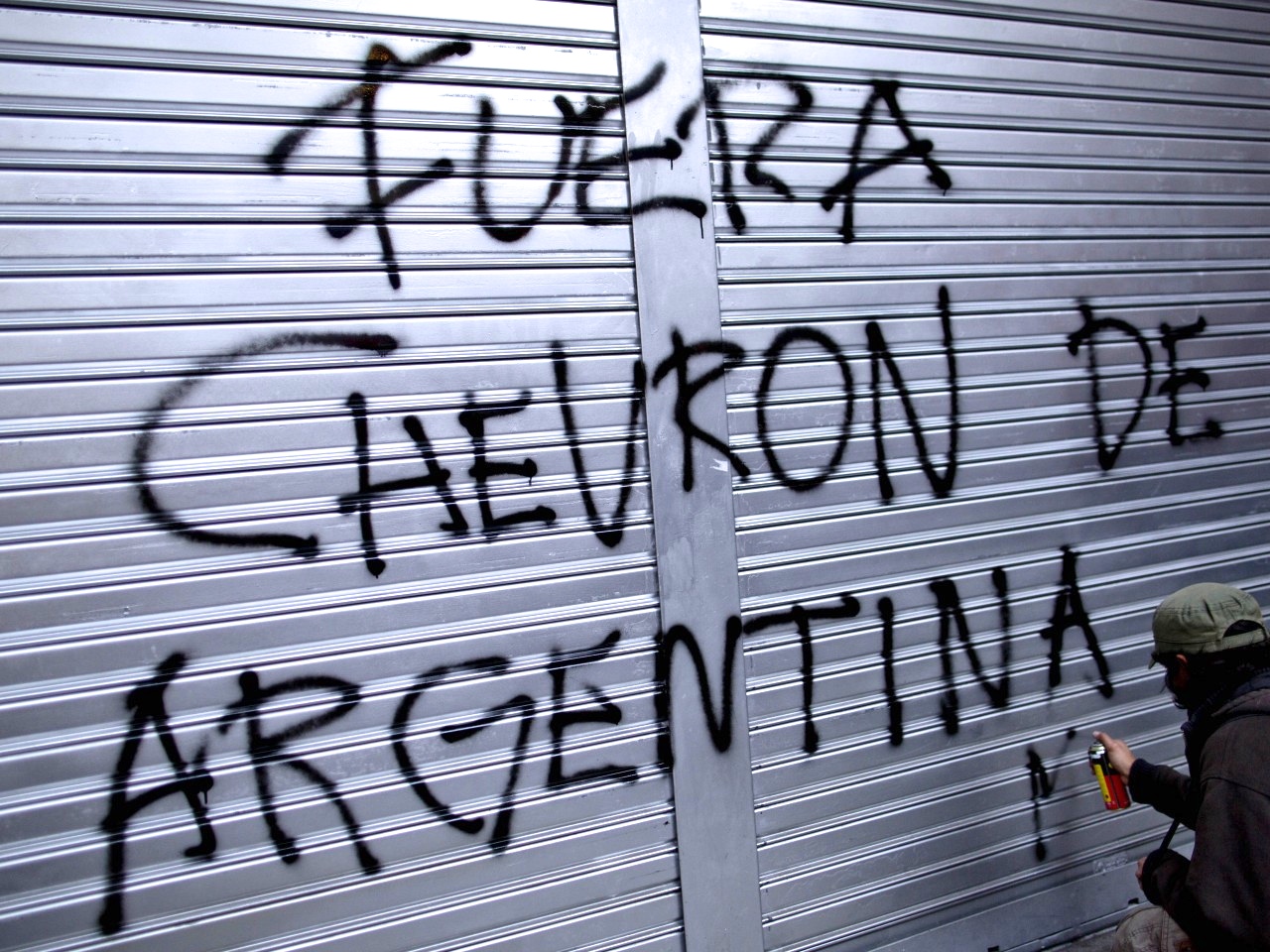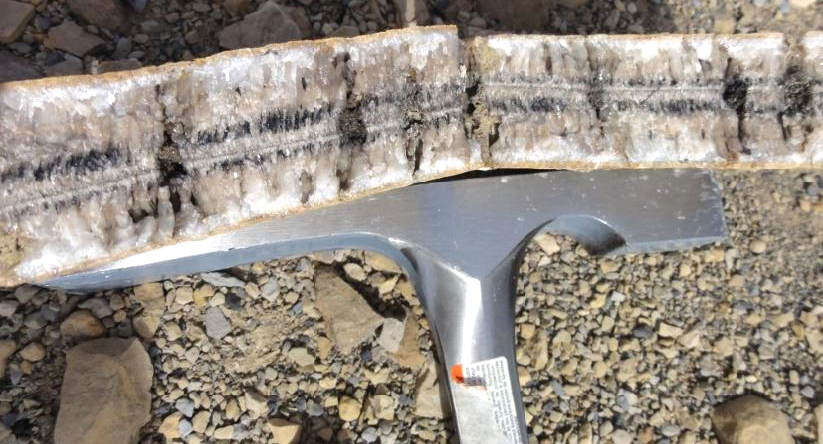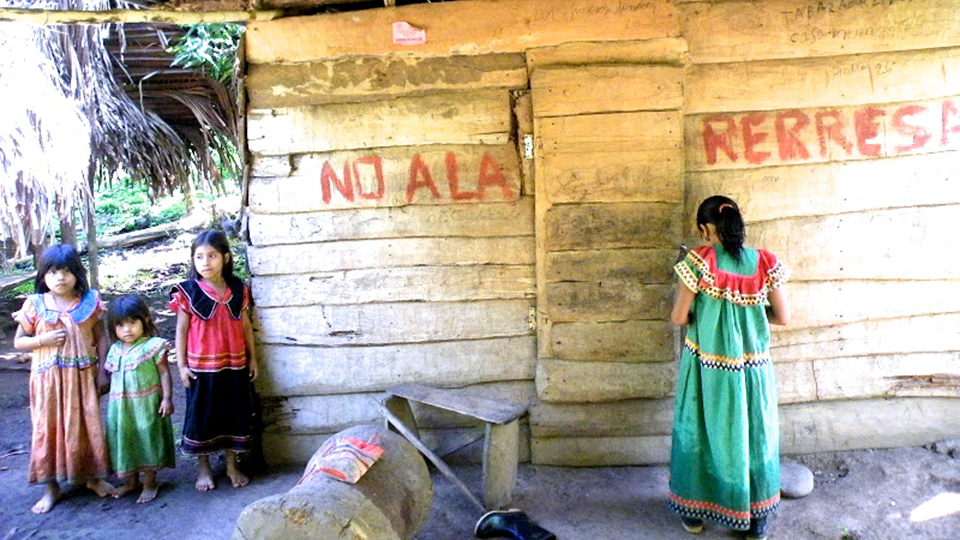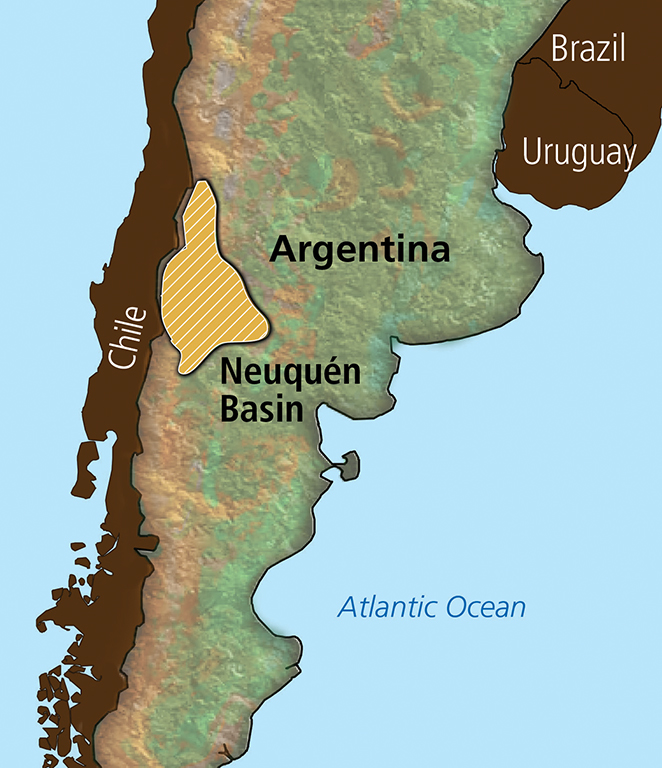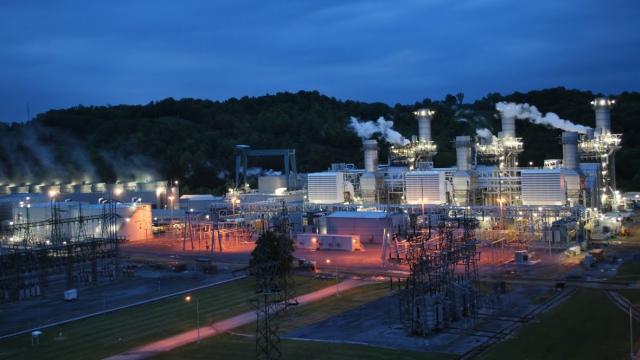
The Vaca Muerta Petroleum System in the western Argentina province of Neuquén is a large shale rock formation with major gas and oil resources. The economy of this arid region, situated in northern Patagonia, has historically oriented toward agricultural production and tourism, making this shale formation the first target for development by unconventional drilling methods in Argentina.
The development of large unconventional gas and oil fields in Argentina has been the subject of much policy maneuvering,citizen organizing, technological debate and financial speculation in the last two years. The situation culminated recently in a series of clashes between local citizen groups and state police.
On August 28 of last year politicians of the Argentinean province of Neuquén agreed by a twenty-five-to-two vote to lease the Loma Campana field in the vast Vaca Muerta formation to oil companies YPF and Chevron for 35 years, while thousands of citizens protested outside the legislature.
Between four and five thousand demonstrators consisting of student groups, indigenous communities, social organizations and labor unions marched on the legislature to protest the deal being made inside. As they neared the building they found their way barred by crowd-control fencing. Some demonstrators moved to lift the fence and continue their march to take their argument to the legislature. The police responded by using gas canisters and rubber bullets. The confrontation left two gravely injured, including one young man who was shot in the chest, and twenty-five others hurt or injured. Some protesters retaliated with rocks; six police officers were also reported injured.
This marked a violent turn in a long process implicating geo-politics and global finance as well as local ecologies and citizen land-rights, as the nation grapples with its energy future. Argentina, rich in natural gas and oil, has long been a net producer of petroleum products, as well as one of the world’s leading producers of biofuels. However, as the U.S. Energy Information Administration notes, limited exploration and exploitation of known resources, and strong regulations protecting consumers from rising costs, have contributed to a difficult situation in the last decade. As the economy has grown and production from existing fields has declined, Argentina has begun to depend increasingly on energy imports.
In this context, the “National Hydrocarbon Sovereignty Law” was passed in 2012. This law establishes a mandate for Argentina to become self-sufficient in hydrocarbons such as gas and oil. The law also initiated the nationalization of the major Argentinean oil company YPF (short for “Financial Petroleum Deposits”). YPF had been controlled by the Spanish conglomerate Repsol since its privatization nearly twenty years earlier. In recent years as Argentina began to import more energy to keep up with demand, Repsol had been criticized by national politicians for failing to make necessary financial investments to maintain and increase production.
The renationalization of YPF is part of a larger trend in the country since the 2001 economic crisis to renationalize major infrastructure networks and companies. It also appears to be a case of prioritizing industrial development and economic growth through resource extraction over the “National Environmental Law (No. 25675)” which calls for environmental impacts to be studied for any development which might compromise ecological health, or article 41 of the constitution, which states that “every inhabitant has the right to a healthy, productive environment that can satisfy present human needs without compromising the ability of future generations to do so.”
Despite this new push by the federal government, land leases for oil rights are still maintained and negotiated by authorities of the individual provinces of Argentina. This fact could help ensure that national mandates and development issues are situated locally, debated and discussed in the context that they are to be carried out. However, in Neuquén the situation is being resolved less through public debate and agreement than through top-down decision making and violent repression from the provincial capital.
In the case of the Loma Campana oilfield lease, the agreement is between YPF, the province of Neuquén, and the United States-owned multinational corporation Chevron. Chevron’s ownership of Texaco, the company responsible for the oil fields disaster in Ecuador, has rightly given many local and international groups cause for concern and become a flashpoint for rhetoric against the agreement. The Ecuadorian Supreme Court has ruled that Texaco is liable for U$ 9.5 billion in environmental damages; the case is currently being litigated in the New York U.S. District Court because Chevron, their now-parent company, possesses no assets in Ecuador.
After the YPF-Chevron agreement was reached on August 28 and the demonstration in downtown Neuquén dispersed, at least four houses and a community center in the Mapuche community near the Loma Campana oilfield were burned. The culpable parties were never identified. The next-day response was massive - and peaceful. In the capital city of Neuquén, more than 10,000 citizens marched from the central square to the legislature building to protest the use of state violence and the signing of the YPF-Chevron agreement. Mapuche community of Campo Maripe, near the oilfields, organized a human blockade of the main access route to YPF’s ongoing extraction operations. For three days they cut off access to the field until YPF agreed to meet with them.
On September 19, representatives of YPF and Mapuche community announced an agreement to remove all YPF personnel involved in high-volume hydraulic fracturing from Mapuche territory, though conventional extraction operations would continue despite previous indications. Meanwhile YPF and Chevron have drawn up plans for 100 new exploratory wells in Loma Campana in the next 12 months, with the ultimate aim to develop over one thousand exploratory wells at a cost of $15 billion. Following suit, Royal Dutch Shell’s Argentine Unit recently announced plans to ramp up shale investments to half a billion dollars next year in anticipation of favorable regulatory changes. Meanwhile, the provincial government is planning an international auction for unclaimed exploratory rights on another field in the formation.
Two years of machinations culminating in the violence of last August and September, and the hard forward march of global multinational corporations into the Vaca Muerta formation, reveal a typical socio-ecological narrative: corporations and governments cashing in the future of local residents and ecosystems in favor of profits in the present. And yet there are subtleties to these developments in Argentina that demand consideration. While the desires of global multinationals are weighing heavily in local politics, they are also bringing the financial muscle that might enable the nation to become energy independent for at least a generation. And while regulatory frameworks designed in the distant capital of Buenos Aires risk the livelihoods of disenfranchised communities to benefit the nation in general, judicial rulings from the same federal government are affirming the rights of those communities to be consulted and to determine how and if their resources will be exploited.
Argentina has an extreme case of the common fracking condition: it involves national sovereignty, energy security, local land rights, ecological health, and environmental justice. These issues operate at multiple temporal and spatial scales simultaneously, from the withering speed of industrial resource exploitation, to the slow violence of contaminated aquifers and surface waters; from the global significance of one of the world’s major food-producing nations becoming energy-independent, to the torching of a single community center in a small indigenous settlement in far-western Patagonia. The ability of citizens and local interests to understand and operate on multiple scales and fronts at once will be essential as this continues to develop.
3 WAYS TO SHOW YOUR SUPPORT
- Log in to post comments


